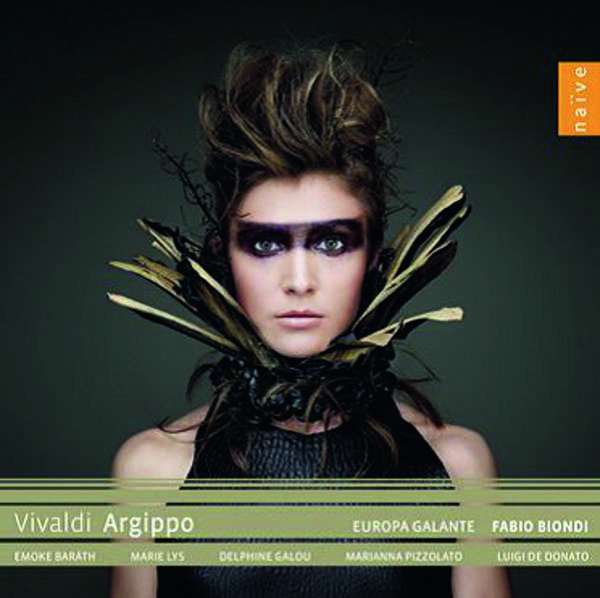 Antonio Vivaldi: Argippo; Emöke Barath, Delphine Galou, Marie Lys, Europa Galante, Fabio Biondi; 2 CDs Naïve OP7079; Aufnahme 10/2019, Veröffentlichung 20/11/2020 (D, F), 27/11/2020 (UK) - Rezension von Remy Franck
Antonio Vivaldi: Argippo; Emöke Barath, Delphine Galou, Marie Lys, Europa Galante, Fabio Biondi; 2 CDs Naïve OP7079; Aufnahme 10/2019, Veröffentlichung 20/11/2020 (D, F), 27/11/2020 (UK) - Rezension von Remy Franck
Die 64. Folge der Vivaldi-Edition von Naïve präsentiert Argippo, eine Oper, die man als Pasticcio bezeichnen kann. Wie es zu Vivaldis Zeiten üblich war, enthält sie eine Kombination aus Vivaldi-Arien und solchen aus Opern seiner Zeitgenossen. Ein reines Recycling-Produkt, aber eines das es in sich hat.
Die Tochter des Großmoguls Tisifaro, Zanaida, steht im Mittelpunkt dieser Geschichte, in der Rivalität in der Liebe, familiäre Konflikte, Intrigen, Missverständnisse und verletzte Gefühle für einfühlsam zärtlichen oder auch flammend-aufgeregten Gesang sorgen, alles sehr emotional und energisch.
Luigi de Donato ist ein fürsorglicher und warmherziger Vater, der sich sehr besorgt zeigt um seine verwirrte Tochter Zanaida, prächtig gesungen von Delphine Galou. Sie bewegt sich auch in den virtuosesten Passagen sehr sicher auf den Spuren von Cecilia Bartoli.
Virtuos und feurig, aber wenn nötig auch sehr sensibel singt auch Emöke Barath die Rolle des Argippo, der sich und seine Osira (Marie Lys, sehr engagiert, opulenter Gesang) verteidigen muss. Baraths Interpretation wird allerdings durch einige gepresste Spitzentöne leicht beeinträchtigt. Marianna Pizzolato singt den Missetäter Silvero ausdrucksmäßig unterschiedlich gut, und ihre Stimme ist für meinen Geschmack nicht agil und nicht farbig genug. Ihr Silvero wirkt so etwas zu ernst und vor allem in der Arie Se la bella tortorella fehlt es Pizzolato an Charme und Feinfühligkeit.
Fabio Biondi und Europa Galante unterlegen den Gesang mit einem brillanten Musizieren und einem großartigem Klang.
The 64th episode of the Vivaldi edition of Naïve presents Argippo, an opera that could be called a pasticcio. As was customary in Vivaldi’s day, it contains a combination of his own arias and those from operas of his contemporaries. It’s a purely recycled product, but an excellent one.
Zanaida, daughter of the Grand Mogul Tisifaro, is at the centre of this story, in which rivalry in love, family conflicts, intrigues, misunderstandings and hurt feelings produce a very emotional and energetic music with sensitive tenderness as well as flaming excitement.
Luigi de Donato is a caring and warm-hearted father who is very concerned about his confused daughter Zanaida, magnificently sung by Delphine Galou. She follows with great confidence in the footsteps of Cecilia Bartoli even in the most virtuoso passages.
In the role of Argippo Emöke Barath is virtuosic and fiery, but if necessary also very sensitive when it comes to protect Osira (Marie Lys, very committed, opulent singing). Barath’s interpretation, however, is slightly impaired by some pressed top notes. Marianna Pizzolato sings Silvero with varying degrees of expressiveness, and her voice is not agile and not colourful enough for my taste. Her Silvero seems too serious and especially in the aria Se la bella tortorella Pizzolato lacks charm and sensitivity.
Fabio Biondi and Europa Galante support the singers with brilliant music and a great sound.




















